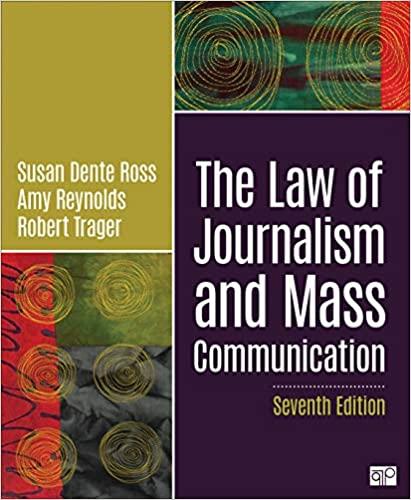Question
Case ABackground: Dr. Laura Wildcat, a61-year oldMarketing Professor from Cornell University, was hired by Bull Enterprises on October 1, 2017. She worked for the company
Case ABackground:
Dr. Laura Wildcat, a61-year oldMarketing Professor from Cornell University, was hired by Bull Enterprises on October 1, 2017. She worked for the company as the Marketing Director, and reported directly to the Chief Executive Officer, Bob Stanford. Laura received a bonus every year for her exceptional performance and won the Best Executive Award in the fall of 2020. However, Bull Enterprises experienced financial losses during the economic downturn caused by the global COVID-19 pandemic.
On April 1, 2021, Bob called Laura in to his office. He told her that she was a good employee, and thanked her for her services, but told her that her contract was being terminated, effective immediately, because of a restructuring triggered by the company's financial losses in the last four quarters. Bob gave her a cheque covering her work up until and including April 1st, and promised to send her another cheque by mail for the minimum number of weeks of notice required under the Employment Standards Act, but stated that he could not offer any further compensation, due to the company's recent financial losses.
Bob asked Laura to sign a printed agreement stating that Bull Enterprises would pay her for two extra weeks' salary, in exchange for her promise not to sue for any other damages for termination. He stated that two weeks was all that he owed her under the Employment Standards Act. Laura refused to sign the statement.
Bob angrily replied that she was lucky to have had any work at all during the pandemic, and urged her to sign the agreement, threatening to withhold her remaining pay if she did not. Laura replied, "I don't think that this is sufficient compensation. I was planning to retire next year. I'd like to run this by my lawyer first." Bob suddenly stood up and ripped up the agreement, shouting, "I've changed my mind. I'm firing you right now for insubordination. You won't get another dollar from me." He called security, who escorted Laura from the building.
Laura came to see you, an employment lawyer. You start a lawsuit against Bull Enterprises for wrongful dismissal. In court, Bull's lawyer states that Laura's poor performance caused the company to experience financial loss, and therefore she was terminated with just cause, and is not entitled to any pay under the Employment Standards Act, or the common law. Consider your response to the judge.
Case AQuestions:
- Discuss the law surrounding wrongful dismissal, considering Bob and the lawyer's statements about the reason for Laura's termination: Did the company have any just cause to fire her? Is there any evidence in Laura's record that her poor performance caused the company's losses, or that she was insubordinate?
- According to the Employment Standards Act (ESA), how many weeks of notice must the company give Laura, if there is no just cause?
- Furthermore, discuss whether the company will be required to pay Laura any additional notice based on common law factors, beyond the amount required by the ESA.
- Explain your answers to the questions above using the information from Working in BC (a guide to the ESA) and Employment Law Video Lecture Video Lectures pt. 1 & 2.
Case BBackground:
Harpreet, the owner of a new studio called Pottery Palace, verbally offered Ravi a full-time contract. Harpreet planned to manage the business affairs of the studio, while employing two workers: Sam, who answered the telephone and sold pottery in the shop, and Ravi, who would work in the studio behind the shop, designing and making all of the pottery that would be sold in the shop. Ravi would use the kiln, clay, dyes, and other tools provided by Harpreet, working at the studio every day from 8:30 am-4:30 pm, according to the schedule Harpreet provided him.
Ravi worked for five weeks without receiving any pay. One day he asked Harpreet when she would pay him. She paused for a moment, and said, "Give me a moment." Ten minutes later, she gave Ravi a cheque with a typed pay stub showing the gross pay, but no deductions for Income Tax, Employment Insurance, or Canada Pension Plan contributions. He asked Harpreet about this, and she stated that this was because Ravi was a contractor, and not an employee. Ravi was surprised as he had been under the impression since hiring that he was an employee.
Ravi decides to consult you, an employment lawyer, to see whether he is an employee or an independent contractor, and what rights he has under the law.
Case BQuestions:
- According to the law, is Ravi an independent contractor or an employee? Explain by applying both the Four-Part Test and the Organization Test, as described in Employment Law Video Lecture Video Lecture pt. 1.
- Is Pottery Palace required to follow the Employment Standards Act (ESA) when paying Ravi? Explain whether Pottery Palace has broken any laws regarding paying Ravi on time.
- Is Pottery Palace required by law to deduct Ravi's Income Tax, Employment Insurance, and Canada Pension Plan contributions from hispay cheque? Why or why not?
- Explain your answers to the questions above using the information from Working in BC (a guide to the ESA) and Employment Law Video Lecture Video Lectures pt. 1 & 2.
Step by Step Solution
There are 3 Steps involved in it
Step: 1

Get Instant Access to Expert-Tailored Solutions
See step-by-step solutions with expert insights and AI powered tools for academic success
Step: 2

Step: 3

Ace Your Homework with AI
Get the answers you need in no time with our AI-driven, step-by-step assistance
Get Started


